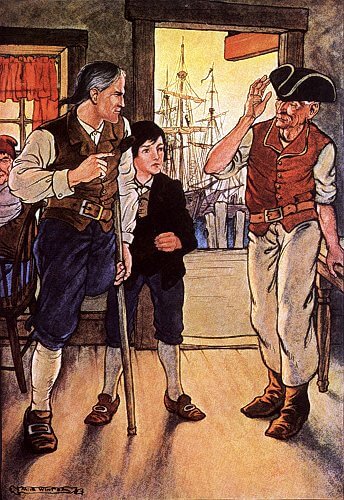Activity 1: Recite the Book Information
- Recite the name of the author, the title of the book, and the title of the chapter.
Activity 2: Narrate the Story
- Narrate the events aloud in your own words.
Activity 3: Study the Story Picture(s)
- Study the story picture(s) and verbally describe the relation to the story.
Activity 4: Map the Story
- In the story, Long John Silver calls Black Dog a 'son of a Dutchman.'
- Dutch people are a group native to the Netherlands.
- Find the Netherlands on the map of Europe.
- Find and name two cities in the Netherlands.
- Which countries border the Netherlands?
Activity 5: Act Out a Passage
Practice acting out the following passage in your best pirate accent.
- And what was Black Dog saying to you? (Long John to Tom Morgan)
- I don't rightly know, sir. (Tom Morgan)
- Do you call that a head on your shoulders, or a blessed dead-eye? (Long John)
Activity 6: Complete Written Narration

- Click the crayon above, and complete page 25 of 'Fourth Grade Prose: Written Narration, Dictation, and Review Questions.'
Activity 7: Complete Copywork and Dictation

- Click the crayon above, and complete pages 25-26 of 'Fourth Grade Prose: Written Narration, Dictation, and Review Questions.'
Activity 8: Color the Image

- Click the crayon above, and complete page 26 of 'Fourth Grade Prose: Written Narration, Dictation, and Review Questions.'
Activity 9: Answer Written Review Questions

- Click the crayon above, and complete page 27 of 'Fourth Grade Prose: Written Narration, Dictation, and Review Questions.'
 Treasure Island
Treasure Island
Treasure Island
Treasure Island


 Treasure Island
Treasure Island
Treasure Island
Treasure Island




